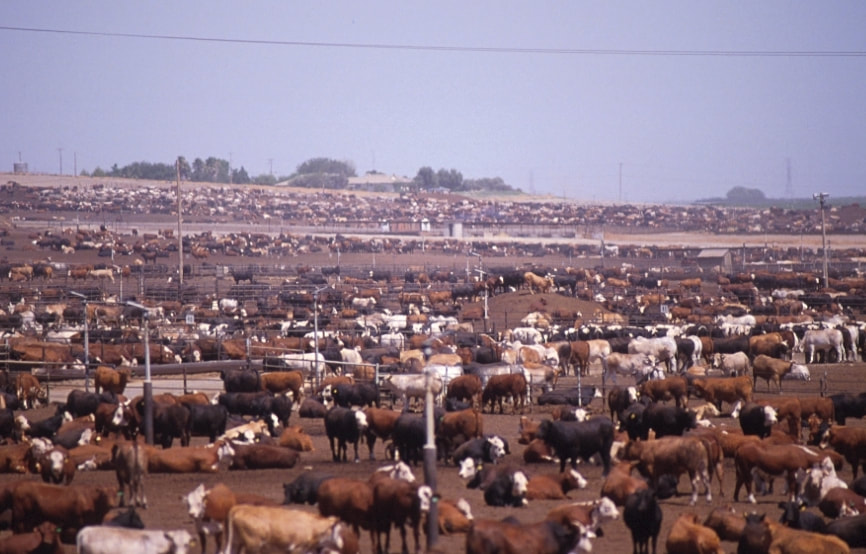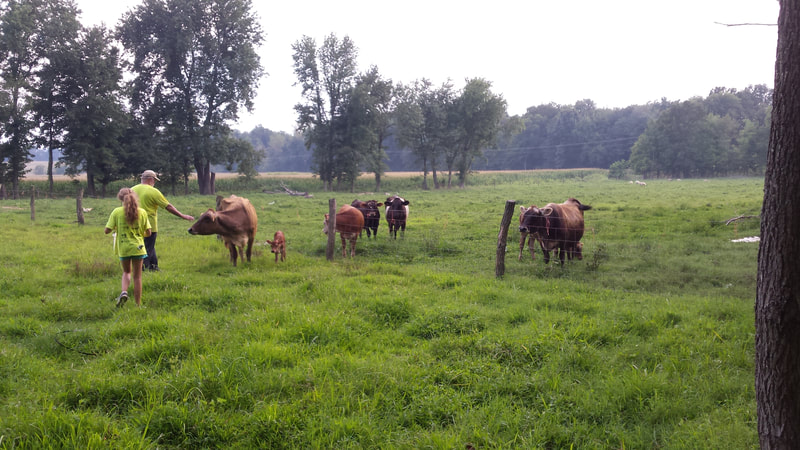Maggie's Farm Beef FAQ
Do you have beef for sale?
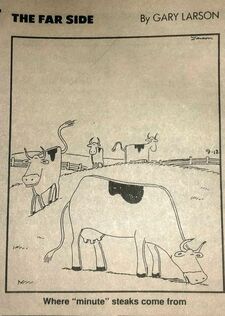
Thank you Gary Larson and farside.com for cow humor!
Yes! You can purchase by the cut direct from the farm.
We may occasionally have whole, half, or quarter beef available.
Please contact us for availability and price.
We may occasionally have whole, half, or quarter beef available.
Please contact us for availability and price.
When do I pay for my beef?
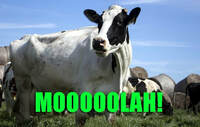
At pick up, although we won't turn down a deposit at time of order. In fact, if you purchase bulk, we will require a deposit and that will be determined based on the amount of meat ordered.
Do you add anything to your processed meats, such as MSG or HFCS?
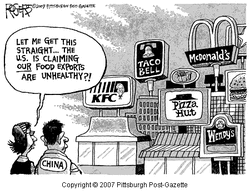
Before answering that question, we'll let you know that our cattle live in a pasture during the summer and eat only grass. In the winter they eat hay which is dry grass. That's pretty much it although they will get an occasional treat of sustainable non-GMO feed.
As of the time of this writing, we don't currently offer any beef products that are seasoned. In the event that we begin offering any kind of processed beef, the amount and type of additives will depend on who processes it.
If this is a huge issue for you and you'd like to be in complete control of what goes into your body, please do an internet search for whatever it is you're looking for (for example: corning your own beef) and you should be able to find a plethora of instructions, at least one of which will suit your needs.
As of the time of this writing, we don't currently offer any beef products that are seasoned. In the event that we begin offering any kind of processed beef, the amount and type of additives will depend on who processes it.
If this is a huge issue for you and you'd like to be in complete control of what goes into your body, please do an internet search for whatever it is you're looking for (for example: corning your own beef) and you should be able to find a plethora of instructions, at least one of which will suit your needs.
Where Is Your Beef Processed?
Due to FDA regulations, we cannot sell beef we process ourselves (we aren't licensed and don't have the resources to become licensed).
While in Indiana, we used the butcher who had an opening. All the beef we currently have on hand was processed at Dewig Meats in Haubstadt, Indiana, because they were the only USDA inspected processors in our area.
While in Indiana, we used the butcher who had an opening. All the beef we currently have on hand was processed at Dewig Meats in Haubstadt, Indiana, because they were the only USDA inspected processors in our area.
What is the difference between beef from Mulberry Creek hogs and the beef I buy in the store?
(opinion)
We've addressed this same question concerning our pork.
Likewise, I could put it this way ...
Likewise, I could put it this way ...
Google Grass-fed v. Grain-fed and you'll find dozens of websites with a variety of opinions, all of them backed up by scientific research. For the record, we are neither medical doctors nor are we licensed dieticians. We're just farmers who care about what we grow and what we eat.
The bottom line is this: cattle are ruminants. Ruminants ruminate - simply, they chew their cud. Ruminants were created to eat (surprise) grass! They were not created to subsist on grain.
Over the past several years, certain agribusinesses have mounted a very successful campaign to convince the consumer (that's us) that grain-fed is better. Better tasting (not necessarily) and better for your health (WAY not). But "we" fell for it! And now it's nearly impossible to find anything but grain-fed beef in the grocery store. Cattle that are fed grain as their primary diet must also be fed a variety of chemical based supplements in order to get the nutrition they need that is not supplied by the grain. These cattle also tend to receive a lot of antibiotics.
Add to that the more recent claim that beef is non-sustainable, that humans were created to be vegetarians, and all kinds of other malarkey. We ask, "where do you get your protein?" Probably some kind of bean - look into how they're produced and then we can talk about beef sustainability. Do those beans fertilize their pasture?
Granted, there are those who refrain from eating beef (or any red meat) for religious reasons or because they can't abide the idea that an animal has to die to feed them. That's fine and we respect that.
There are also those who claim that red meat is unhealthy. Again, we aren't dieticians. We do agree that in general our culture eats too much meat (although around our dinner table we disagree on how much is too much). But humans need protein to be healthy. The best source for protein is meat. It's just that simple. We believe that grass-fed beef is healthier (for both us and the cattle) and have the opinion that it's also tastier than grain-fed.
Since we first added this section to the website, commercial beef producers have discovered that they can sell their beef for more if they say it's been grass-fed. The truth is, almost all cattle are raised on some kind of range or pasture for most of their lives. However, commercial animals are pretty much unilaterally finished out on grain, which adds fat and size. If it doesn't say 100% Grass Fed, you can bet it was grain finished, which defeats all the goodness of grass-fed.
So don't go to the grocery store! Head on over to LocalHarvest or EatWild to find out where to purchase locally grown grass-fed meat, or just do an internet search. (By the way, you won't find us listed on EatWild simply because they charge more than we can pay for advertising right now.) Contact us to learn how to purchase Maggie's Farm 100% Grass-Fed Beef. Our price lists and order forms should be on the home page, our Front Porch.
See also our perspective on Maggie's Farm on Price vs. Cost.
Don't miss our Beef recipes section!
We really aren't experts, but here are some links to a few folks who are more eloquent than we are on the subject.
The bottom line is this: cattle are ruminants. Ruminants ruminate - simply, they chew their cud. Ruminants were created to eat (surprise) grass! They were not created to subsist on grain.
Over the past several years, certain agribusinesses have mounted a very successful campaign to convince the consumer (that's us) that grain-fed is better. Better tasting (not necessarily) and better for your health (WAY not). But "we" fell for it! And now it's nearly impossible to find anything but grain-fed beef in the grocery store. Cattle that are fed grain as their primary diet must also be fed a variety of chemical based supplements in order to get the nutrition they need that is not supplied by the grain. These cattle also tend to receive a lot of antibiotics.
Add to that the more recent claim that beef is non-sustainable, that humans were created to be vegetarians, and all kinds of other malarkey. We ask, "where do you get your protein?" Probably some kind of bean - look into how they're produced and then we can talk about beef sustainability. Do those beans fertilize their pasture?
Granted, there are those who refrain from eating beef (or any red meat) for religious reasons or because they can't abide the idea that an animal has to die to feed them. That's fine and we respect that.
There are also those who claim that red meat is unhealthy. Again, we aren't dieticians. We do agree that in general our culture eats too much meat (although around our dinner table we disagree on how much is too much). But humans need protein to be healthy. The best source for protein is meat. It's just that simple. We believe that grass-fed beef is healthier (for both us and the cattle) and have the opinion that it's also tastier than grain-fed.
Since we first added this section to the website, commercial beef producers have discovered that they can sell their beef for more if they say it's been grass-fed. The truth is, almost all cattle are raised on some kind of range or pasture for most of their lives. However, commercial animals are pretty much unilaterally finished out on grain, which adds fat and size. If it doesn't say 100% Grass Fed, you can bet it was grain finished, which defeats all the goodness of grass-fed.
So don't go to the grocery store! Head on over to LocalHarvest or EatWild to find out where to purchase locally grown grass-fed meat, or just do an internet search. (By the way, you won't find us listed on EatWild simply because they charge more than we can pay for advertising right now.) Contact us to learn how to purchase Maggie's Farm 100% Grass-Fed Beef. Our price lists and order forms should be on the home page, our Front Porch.
See also our perspective on Maggie's Farm on Price vs. Cost.
Don't miss our Beef recipes section!
We really aren't experts, but here are some links to a few folks who are more eloquent than we are on the subject.
